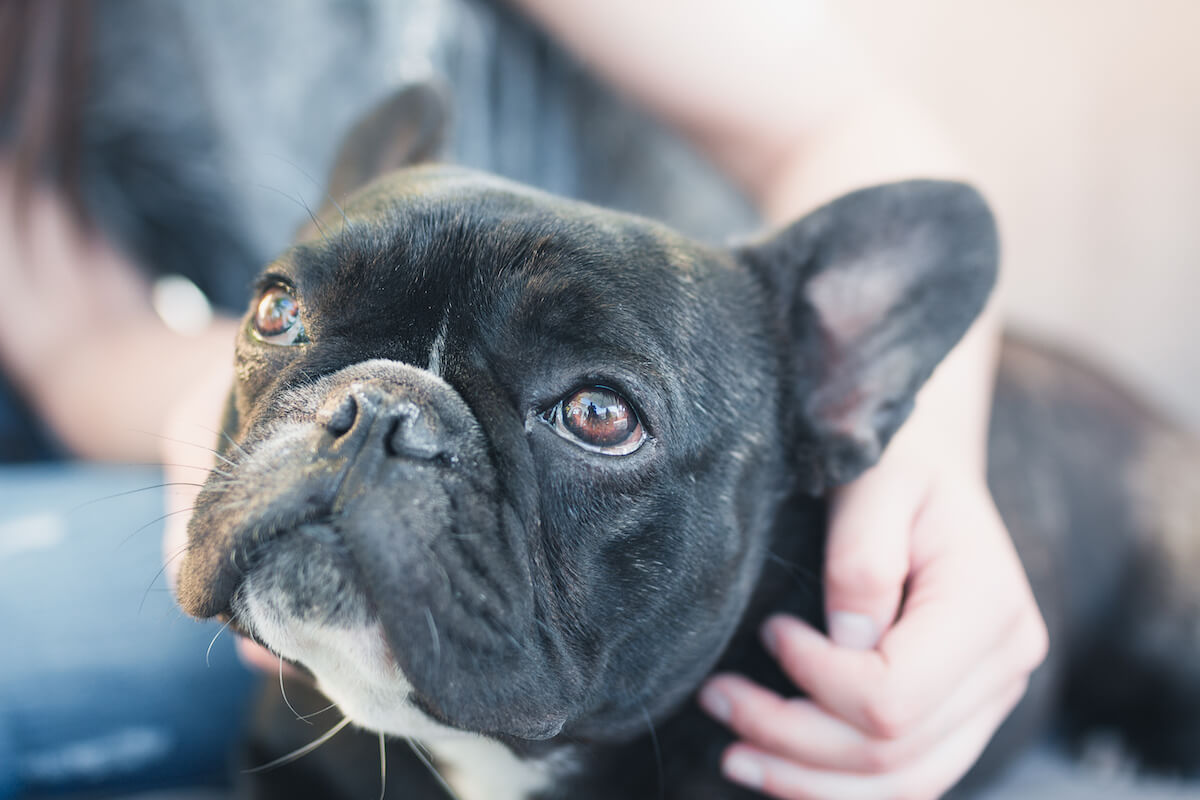As a professional in the field, I am often asked about the lifespan of French Bulldogs. It is a topic that garners much curiosity and concern. Did you know that French Bulldogs have one of the shortest lifespans among dog breeds? Many people are surprised to learn that these adorable and popular dogs do not live as long as other breeds.
The reasons behind the relatively short lifespan of French Bulldogs are multifaceted. One significant factor is their breeding history. French Bulldogs were originally bred for bull-baiting, a brutal sport that required sturdy and compact dogs. Over time, breeders focused more on appearance and temperament, leading to a reduction in genetic diversity. This lack of genetic diversity has resulted in a variety of health issues that can affect the lifespan of French Bulldogs. Additionally, their unique physical features, such as their short noses and compact bodies, contribute to respiratory and spinal problems that can shorten their lives. Despite these challenges, responsible breeding practices and proactive health care can help mitigate some of these issues and improve their quality of life.
French Bulldogs have a shorter lifespan compared to some other dog breeds due to various factors. One of the reasons is their brachycephalic skull structure, which can lead to breathing difficulties and respiratory issues. They are also prone to certain genetic health issues such as heart problems and spinal disorders. Additionally, the breed’s small size and delicate nature make them susceptible to injuries and accidents. Proper care, nutrition, regular veterinary check-ups, and providing a safe environment can help ensure their well-being and potentially extend their lifespan.

Why Do French Bulldogs Not Live Long?
French Bulldogs are beloved by many for their unique appearance and charming personalities. However, one unfortunate aspect of owning a French Bulldog is their relatively short lifespan. But why do French Bulldogs not live long? In this article, we will explore the factors that contribute to the shorter lifespan of French Bulldogs, including genetic predispositions, health issues, and breeding practices.
Genetic Predispositions
Genetics play a significant role in the lifespan of French Bulldogs. Over the years, this breed has been subject to intensive selective breeding, resulting in a limited gene pool. This genetic bottleneck has led to various health issues, including respiratory problems, skin allergies, and musculoskeletal disorders. These genetic predispositions make French Bulldogs more susceptible to certain illnesses and conditions, which can ultimately shorten their lifespan.
One of the most common health issues in French Bulldogs is brachycephalic syndrome. This condition affects dogs with short, pushed-in faces, causing breathing difficulties due to narrowed airways. The compacted airways limit the amount of oxygen the dog can take in, leading to respiratory distress. Additionally, the shorter snouts of French Bulldogs make it challenging for them to regulate their body temperature, further exacerbating their respiratory issues.
French Bulldogs are also prone to spinal disorders, such as intervertebral disc disease. The compact and elongated bodies of these dogs put strain on their spines, making them more susceptible to disc herniation and other spinal abnormalities. These conditions can cause pain, mobility issues, and even paralysis, significantly impacting the dog’s quality of life and overall lifespan.
Health Issues
In addition to genetic predispositions, French Bulldogs also face various health issues that can affect their longevity. One of the most prevalent concerns is obesity. Like many brachycephalic breeds, French Bulldogs have a tendency to gain weight easily. Obesity can lead to numerous health problems, including joint issues, diabetes, heart disease, and a decrease in overall lifespan.
Another health issue commonly seen in French Bulldogs is allergies. These dogs can be prone to both environmental and food allergies, which can lead to skin problems, itchiness, and infections. Allergies can cause discomfort and potentially necessitate long-term medical treatment, ultimately impacting the dog’s well-being.
French Bulldogs are also susceptible to eye conditions such as cherry eye, dry eye, and corneal ulcers. These eye problems can cause discomfort, vision impairment, and may require surgical intervention. Additionally, French Bulldogs have a higher risk of developing certain types of cancer, such as mast cell tumors and lymphoma, which can significantly impact their lifespan.
Breeding Practices
The breeding practices associated with French Bulldogs can contribute to their shorter lifespan. These practices often prioritize physical appearance over health, leading to the perpetuation of genetic issues within the breed. Breeding French Bulldogs with extremely short snouts, excessive skin folds, and compact bodies may result in specific desirable traits but also exacerbate their health problems.
Furthermore, the demand for French Bulldogs has led to indiscriminate breeding and the emergence of irresponsible breeders, often referred to as “backyard breeders” or “puppy mills.” These breeders prioritize profit over the well-being of the dogs, and as a result, may not conduct proper health screenings or genetic testing, leading to an increased prevalence of health issues in the breed.
It’s crucial for prospective French Bulldog owners to research and choose reputable breeders who prioritize the health and well-being of their dogs. Responsible breeders will conduct health screenings, genetic testing, and strive to improve the overall health of the breed.
How Can We Improve the Lifespan of French Bulldogs?
While French Bulldogs may have a shorter lifespan compared to some other dog breeds, several measures can be taken to improve their overall health and increase their lifespan:
- Ensure a balanced and nutritious diet tailored to the specific needs of French Bulldogs.
- Monitor and control their weight to prevent obesity and associated health issues.
- Regular exercise to promote optimal physical fitness and maintain a healthy weight.
- Provide regular veterinary care, including vaccinations, preventive treatments, and routine check-ups.
- Implement proper dental care to prevent dental disease, which can impact overall health.
- Take steps to minimize exposure to allergens that may trigger allergies in French Bulldogs.
- Provide a safe and comfortable living environment, ensuring proper ventilation and temperature regulation.
- Practice responsible breeding by selecting reputable breeders who prioritize health and genetic testing.
By following these guidelines and making informed decisions when it comes to their care and breeding, we can work towards improving the lifespan of French Bulldogs and ensuring that they lead happy and healthier lives.
Key Takeaways: Why do French Bulldogs not live long?
- French Bulldogs have a shorter lifespan compared to other dog breeds due to their specific health issues.
- Brachycephalic syndrome, which affects their breathing, is a common problem in French Bulldogs.
- French Bulldogs are prone to heart disease, which can contribute to a shorter lifespan.
- They are also susceptible to spinal disorders and joint issues that can impact their overall health and longevity.
- Proper care, including regular veterinary check-ups, a healthy diet, and exercise, can help extend the lifespan of French Bulldogs.
Frequently Asked Questions
French bulldogs are beloved pets known for their unique appearance and friendly nature. However, they are also prone to certain health issues that can impact their lifespan. In this FAQ section, we will explore the reasons why French bulldogs may not live as long as other dog breeds.
1. What health issues are common in French bulldogs?
French bulldogs are susceptible to several health problems, which can affect their longevity. Some of the most common health issues in French bulldogs include:
– Brachycephalic syndrome: French bulldogs have a short, flat face, which can lead to breathing difficulties and respiratory problems.
– Intervertebral disc disease: This condition affects the spinal discs and can cause pain, mobility issues, and even paralysis.
– Hip dysplasia: French bulldogs can develop hip dysplasia, a condition that affects the hip joint and can cause discomfort and difficulty in movement.
– Allergies and dermatological issues: French bulldogs are prone to allergies and skin problems, which can require lifelong management.
– Heart disease: French bulldogs are predisposed to certain heart conditions, such as dilated cardiomyopathy, which can impact their heart’s ability to function properly.
2. How does the anatomy of French bulldogs contribute to their shorter lifespan?
The distinctive physical features of French bulldogs can play a role in their reduced lifespan. The brachycephalic (short snout) structure of their face can lead to breathing difficulties and respiratory issues. Additionally, their compact body shape and genetic predispositions can contribute to various health problems, as mentioned before. These factors, combined with their smaller size, make French bulldogs more susceptible to certain health conditions that can impact their longevity.
3. Can lifestyle and care influence the lifespan of French bulldogs?
Absolutely! While certain health issues in French bulldogs may be genetic, providing them with a healthy lifestyle and proper care can significantly impact their lifespan. Here are some factors that can positively influence the longevity of French bulldogs:
– Balanced diet: Feeding your French bulldog a nutritious diet appropriate for their age and specific needs can promote overall health and prevent obesity-related issues.
– Regular exercise: Engaging in regular exercise, such as walks and playtime, can help maintain a healthy weight, strengthen their muscles, and support their general well-being.
– Veterinary care: Regular check-ups, vaccinations, and preventive treatments can help identify potential health concerns early and provide timely intervention.
– Dental hygiene: Taking care of your French bulldog’s teeth through regular brushing and professional dental cleanings can prevent dental diseases that can impact their overall health.
4. Are there any steps I can take to minimize the risk of health issues in my French bulldog?
While it’s not possible to eliminate the risk of health issues entirely, there are certain steps you can take to minimize these risks and promote the well-being of your French bulldog:
– Choose a reputable breeder: Ensuring that you get your French bulldog from a responsible and ethical breeder can reduce the chances of genetic health issues.
– Maintain a healthy weight: Obesity can exacerbate various health problems, so it’s important to keep your French bulldog at a healthy weight through proper diet and exercise.
– Provide a safe environment: Removing potential hazards from your home, such as toxic plants or small objects that can be swallowed, can reduce the risk of accidents and injuries.
– Grooming and hygiene: Regular grooming, including cleaning their ears and trimming their nails, can prevent some common health issues and promote overall cleanliness.
5. How long do French bulldogs typically live?
The average lifespan of French bulldogs typically ranges from 10 to 12 years. However, individual dogs may live longer or shorter lives depending on various factors, including their overall health, genetics, and the care they receive. With proper care and attention, it’s possible for some French bulldogs to live into their early teens or beyond.

French Bulldog Life Expectancy: . How to Help Your Frenchie Live a Long and Happy Life
French Bulldogs have a shorter lifespan due to various health issues that are common in the breed. These dogs are prone to respiratory problems, such as brachycephalic obstructive airway syndrome, which can make breathing difficult and lead to other complications.
Their flat faces can also cause dental problems, skin infections, and eye conditions. Additionally, French Bulldogs often have a genetic predisposition to certain diseases, including heart conditions, spinal disorders, and cancer. These factors contribute to their shorter life expectancy compared to other breeds.
